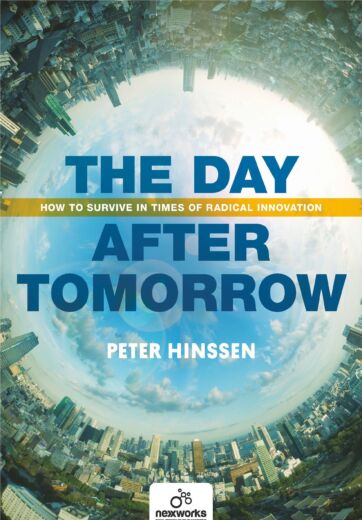One of the most perverse side effects of the emerging digital economies of the 21st century is the creation of so-called "category kings": absolute winners-take-all in the digital land grab. On the European continent for example, the market share of Google in search hovers above 90%. Google is the absolute category king of search in Europe, to the extent that if you ask people who would be No. 2, most users would have no clue. It’s winner-takes-all on steroids.

The Silicon Valley ecosystem has historically been an incredible producer of category kings: Google in Search. Android in Mobile. Facebook in social media. When you look at ride sharing, Uber is the category king. The No. 2 player, Lyft, is struggling to hold on. Amazon, based on the US West Coast, is category king in e-commerce, to such an extent that in 2016 more than 66% of all the growth in e-commerce in the U.S. could be traced back to Amazon. Amazon is not just an e-commerce category king reaching out to individual consumers. It is also a massive B2B category king in the domain of cloud services through the amazing success of Amazon Web Services.
We still have to get our head around the economics of category kings. In the 20th century we've seen the rapid growth of corporations, wielding massive powers and global impact. But we did not have the network effects and feedback loops of digital platforms resulting in category kings. In the 20th century, we had many car companies of significance competing against each other. We had many oil companies, and many banks and insurance companies. The economics of the 21st century might be different. It's the consumer who decides, and network effects breed category kings. If all of your friends are on SnapChat, why would you go anywhere else? If all of your contacts are on LinkedIn, why would you go anywhere else?
In the last couple of years we have observed the rapid rise of Chinese-based digital category kings. The exact same phenomena we've seen coming out of the Silicon Valley ecosystem has also emanated from China. Baidu is the undisputed leader in search in China. Alibaba is perhaps even more impressive and innovative than Amazon and is not just B2B and B2C but wants to control everything in between. My favorite is Tencent, the owner of WeChat, which has become the de facto operating system of China. If you want to use any digital service or pay for anything with your mobile, WeChat is the only way to go.
For the last couple of years, the Chinese digital ecosystem was seen as a purely local phenomenon. Visitors to China would wonder at the marvels of a society transforming into a cashless society, fuelled by AliPay and WeChat. But most people believed the impact of such platforms stopped at the country’s borders and would have no impact beyond them.
I believe that is about to change on a massive scale.
It might be true that the rise of the digital Chinese category kings was triggered by the Great Firewall of China. As you know, the Chinese authorities blocked many of the Silicon Valley players from deploying their activities inside China. As a result, the Chinese players were able to develop their own activities and become giant digital powerhouses. Perhaps initially these players copied the Silicon Valley companies, products and services to grow. But today, many of these players are developing solutions that are far more innovative than their U.S. West Coast equivalents. The rise of Facebook as a social media platform has been impressive in terms of numbers, but the development of WeChat into a digital services platform leaves Facebook in the dust in terms of innovative breakthrough features.
Today China is aggressively developing its economic policy to greatly expand its economic footprint. The notion of the new Silk Road, launched in 2015, is perhaps the most intriguing global phenomenon to observe, though it bizarrely does not attract much attention or understanding in the West. The total project will be a massive infrastructure play totaling more than $8 trillion in investments.
The Chinese are developing high-tech infrastructure in Africa to insure their supply of vital resources, and are expanding their footprint into the African continent. But while they are developing their economic activities, they are expanding their digital footprint as well. Very soon, if you want to be part of the new Silk Road and want to take advantage of the Chinese expansion, you will use the Baidus, Alibabas and Tencents of this world.
The new Silk Road is expanding rapidly, and now extends all the way to Europe, where the Chinese now fundamentally control the Piraeus harbor in Athens and are building high-speed train networks in Eastern Europe.
This dynamic will polarize the economic future of the 21st century. Europe is caught in the middle, and - with the exception of booking.com and Spotify - has virtually no digital category kings to speak of. And one can hardly believe that holiday bookings and streaming music will be able to uphold the old continent. I firmly believe that Europe has greatly missed out on the opportunity to build digital platforms players of its own. Europe has no search engine, no social media platform. In e-commerce, Europe is being divided between Alibaba and Amazon. Local players in smaller geographical areas are bracing themselves until Amazon descends into their country to take control.
Surprisingly enough, a lot of this has to do with geopolitical military activities. Having worked with many high-powered technology scale-ups in Silicon Valley over the years, it is not hard to notice the impact of DARPA (the Defense Advanced Research Project Agency), which was developed not long after the U.S. got spooked by Sputnik in the middle of the Cold War. The Russians had launched the Sputnik satellite that would fly over the U.S. Americans could turn on their radio sets and tune in to hear its bleeping signals.
DARPA was created in 1958 to make sure that the United States would never again be technologically humiliated as it had been in the case of the Sputnik incident. Boatloads of U.S. military money was pumped into technological innovation. The internet as we know it was a DARPA project. The first self-driving cars at Google, designed by Sebastian Thrun, were DARPA projects. It is amazing to see how influential the U.S. military funding from DARPA has been in creating the giants of Silicon Valley.
In the Chinese ecosystem, there is often the reproach that the Chinese digital category kings are too closely associated with the Chinese government. True, the growth of companies like Alibaba or Tencent would not have been possible without the connections, support and control of the Chinese authorities. Telecom infrastructure giants such as Huawei that are powering much of the backbone infrastructure of European Telecom operators have been scrutinized for their connections to the Chinese military. Huawei was founded by people close to the Chinese military, and when a Belgian national operator called Proximus decided to run its complete mobile infrastructure on Huawei equipment, this led to heated debates in Belgium: people were asking if it was wise to trust a company to supply sensitive and critical infrastructure that was so closely connected to the Chinese military.
I would argue the other ecosystem easily has as many conflicts. DARPA runs deep through the veins of many Silicon Valley giants, and the conflicts can be even more intense than in China. Palantir is the magic machine learning neural network whose A.I.-powered intelligence software helped find Osama Bin Laden. Palantir is used by the NSA and the Department of Homeland Security, and is also used by many European banks for fraud detection and to fight international money laundering, among other things. Palantir was founded by Peter Thiel and had as its first venture capital investor the investment arm of the C.I.A.
On the other hand, Europe, which has had peace for more than 70 years., lacks any coordinated military intelligence involvement in the high-tech industry. Its military activities have been extremely scattered and as a result there is no European DARPA. This could perhaps be one of the reasons why Europe doesn't have an established set of digital category kings.
But all is not lost for the old continent. Or for the other ones, as a matter of fact. Every new set of technologies will bring the opportunity to seize them and turn them into global powerhouses. Take the embryonic technology of blockchain, which is poised to change the landscape of transactions, and thus B2B. It is going to have as much impact as B2C did 25 years ago and as much as the World Wide Web did on the world of content. But if regions don't step up to the plate and put all their efforts and force in leveraging the blockchain, it will be incredibly difficult to compete with the two giant ecosystems, in Silicon Valley and in China.
We are still in the early days of a new century, an era governed by not just new technologies but by different economic behaviors, economics systems and economic paradigms. The advent of network effects on our global economy will undoubtedly alter the geopolitical dimensions of power. If the political leaders of the laggards want to keep their continents relevant, they really should pay close attention to these massivedigital tectonic shifts. If not, it might soon be too late.
